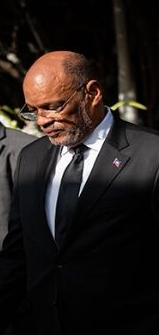
Kingston, March 12 (RHC)-- Haiti’s unelected Prime Minister Ariel Henry has announced he will resign once a transitional council is established. Henry made the announcement after Caribbean leaders held an emergency meeting in Jamaica to discuss the crisis in Haiti, where armed groups launched an uprising against Henry last week.
U.S. Secretary of State Tony Blinken attended the meeting and pledged $100 million to help finance the deployment of a multinational force mission to Haiti.
Ariel Henry announced his plan to resign in a video message posted online. He said: “After the Council of Ministers, it’s been agreed to set up a presidential transitional council. Once chosen, the council will govern over different sectors of national life. … Haiti wants peace. Haiti needs stability. Haiti needs sustainable development. Haiti needs to rebuild democratic institutions. I’m asking all Haitians to remain calm and do everything they can for peace and stability to come back as fast as possible for the good of the country.”
The Miami Herald is reporting CARICOM has proposed a plan to set up a seven-member presidential panel that would appoint a new interim prime minister for Haiti. Barbados Prime Minister Mia Mottley said the panel would only include Haitians who support the deployment of a U.N.-backed security force.
Last week, Ariel Henry traveled to Kenya, which is slated to lead the security mission. He has been unable to return home and was reportedly most recently in Puerto Rico.
On Monday, one of the leaders of the recent armed uprising in Haiti, Jimmy Chérizier, who is known as “Barbecue,” warned against outside forces picking Haiti’s next leader.
“We take this opportunity to say to the international community that if it continues down this path, we will plunge Haiti into chaos when it chooses a small group of politicians and negotiates with them on paper to decide who can be president and what kind of government we’re going to have. Today it’s clear that it’s the inhabitants of the working-class districts and the Haitian people who know what they’re suffering at the moment, and it’s up to them to choose the person who’s going to lead them and the way he’s going to lead them.”

